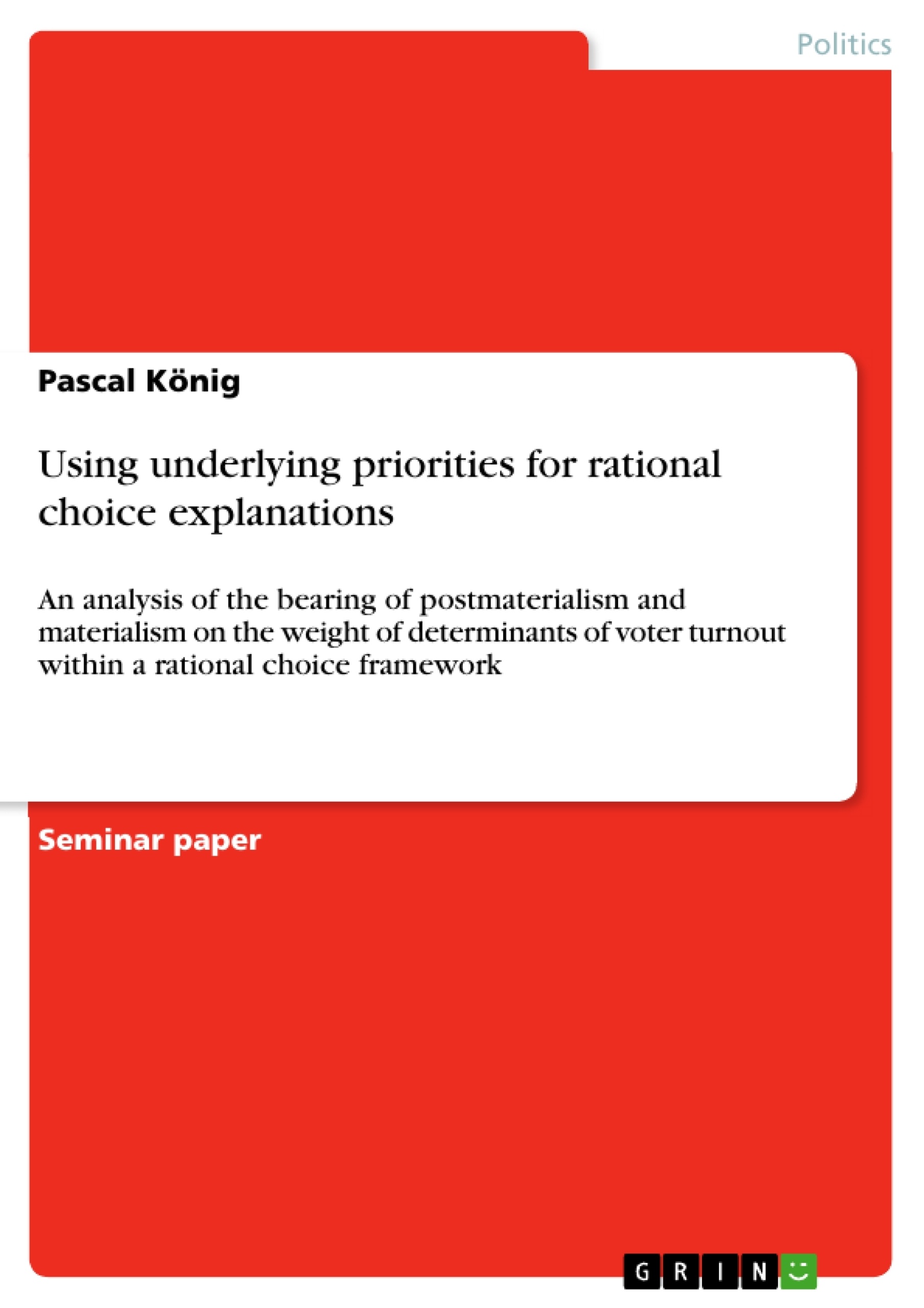This enquiry deals with the shortcomings of rational choice theory in explaining voter turnout as a rational - i.e. efficient in terms of costs and benefits - act. It is argued that intrinsic benefits, i.e. benefits that accrue to the citizen independent of an election outcome, should provide a proper explanatory potential if one can account for different implications of these benefits for different voters. The rationale should hold for benefits in general, though. Underlying coherent priorities in the form of political values (materialism vs. postmaterialism) are used to differentiate voters and to probe for differing impacts of determinants of voter turnout depending on different underlying values. The thesis is that the impacts of these determinants differ for different values. The tested determinants, taken from the literature, are appreciation of democracy, social norms, party identification and material resources. Hypotheses about impacts are formulated on the basis of the theory of political values for every determinant and tested by means of logistic regression employing data from German election studies. Whereas the impacts of social norms and material resources vary by underlying values, the results for appreciation of democracy and party identification remain inclusive.
Inhaltsverzeichnis (Table of Contents)
- Introduction
- Political Values and political participation
- Rational Choice Theory's solutions to explaining voter turnout
- Expected impacts of the determinants of voting for different political values
- Measures and Data
- Results
- Interpretation and Discussion
Zielsetzung und Themenschwerpunkte (Objectives and Key Themes)
This paper aims to contribute to explaining voter turnout within a rational choice framework by addressing the shortcomings of existing explanations. It argues that intrinsic benefits, which accrue to citizens independent of election outcomes, can provide a more robust explanatory potential if one considers their differing implications for voters with varying political values.
- The limitations of rational choice theory in explaining voter turnout
- The role of intrinsic benefits in understanding voter participation
- The impact of political values (materialism vs. postmaterialism) on voter behavior
- The influence of determinants such as appreciation of democracy, social norms, party identification, and material resources on voter turnout
- Exploring the varying effects of determinants for voters with different political values
Zusammenfassung der Kapitel (Chapter Summaries)
- Introduction: This chapter introduces the challenge of explaining voter turnout using rational choice theory, highlighting the paradox of voter rationality and the limitations of existing explanations. The concept of intrinsic benefits as a possible solution is discussed, along with the need to account for their varying effects on different voters.
- Political Values and political participation: This chapter delves into the theory of political values, specifically focusing on materialism and postmaterialism as underlying priorities that influence individuals' political attitudes and behaviors.
- Rational Choice Theory's solutions to explaining voter turnout: This chapter examines the existing solutions proposed by rational choice theory to explain voter turnout. The shortcomings of these solutions are explored, particularly the limitations of focusing solely on instrumental benefits and the need to incorporate intrinsic benefits.
- Expected impacts of the determinants of voting for different political values: This chapter outlines the theoretical framework and hypotheses regarding the expected impacts of various determinants of voter turnout, such as appreciation of democracy, social norms, party identification, and material resources, on voters with differing political values (materialism vs. postmaterialism).
- Measures and Data: This chapter describes the measures and data used in the analysis, including details about the data sources and variables used to test the hypotheses.
- Results: This chapter presents the empirical findings of the analysis, examining the relationships between the determinants of voter turnout and the underlying political values of voters.
- Interpretation and Discussion: This chapter interprets the results of the analysis, discussing the implications of the findings for understanding voter turnout and the role of political values in shaping voter behavior.
Schlüsselwörter (Keywords)
The key terms and concepts of this paper include rational choice theory, voter turnout, intrinsic benefits, political values, materialism, postmaterialism, appreciation of democracy, social norms, party identification, material resources, logistic regression, and German election studies.
Frequently Asked Questions
What is the "paradox of voter turnout" in rational choice theory?
It refers to the difficulty of explaining why people vote when the individual costs usually outweigh the instrumental benefits (the chance of one vote deciding an election).
What are "intrinsic benefits" in the context of voting?
Intrinsic benefits are rewards that a citizen receives from the act of voting itself, independent of the election's outcome, such as fulfilling a social norm or expressing political values.
How do political values like materialism and postmaterialism affect voter behavior?
Underlying priorities (values) differentiate voters. The study probes how determinants like social norms or material resources have different levels of impact depending on whether a voter holds materialist or postmaterialist values.
Which determinants of voter turnout were tested in this study?
The study tested four key determinants: appreciation of democracy, social norms, party identification, and material resources.
What were the findings regarding social norms and material resources?
The analysis showed that the impacts of social norms and material resources on the decision to vote vary significantly based on the individual's underlying political values.
What data was used for the empirical analysis?
The hypotheses were tested using logistic regression analysis based on data from German election studies.
- Quote paper
- Pascal König (Author), 2009, Using underlying priorities for rational choice explanations, Munich, GRIN Verlag, https://www.grin.com/document/153775



